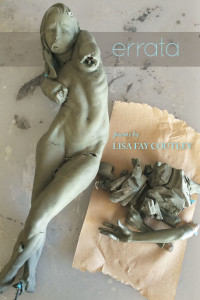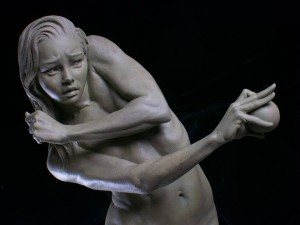Errata

Purchase via Amazon or send $18 as a Paypal Gift for a signed copy.
Winner of the 2014 Crab Orchard Series in Poetry Open Competition Award
*Finalist for Foreword Reviews’ 2015 Book of the Year Award
*Finalist for the Society of Midland Authors’ Best Book of 2015 SMA Award
Taking Sylvia Plath as its acknowledged lodestar, Coutley’s bold first collection offers an unsentimental extension of midcentury confessional poetry. In spare, angular language that snarls with music, she gives fierce voice to the daughter, the lover, the mother to expose the secret chafes and reframings of a woman’s experience, bearing witness to the errata of lived experience against expectation—‘not,’ as she writes, ‘for the transformation but the record.’ Coutley dares her readers to a staring contest and never looks away.
—Kimberly Johnson, author of Uncommon Prayer
The beauty in Lisa Fay Coutley’s Errata is a perilous one—the landscape of the book its own destiny—corrective, exacting. Her lexicon holds with lovely tension “the word fragile, the word impassable”—and still we learn from Coutley to navigate “by the compass of a rattlesnake’s tongue” and to trust “ravens tugging at the firmament.” Her subjects ranging from family and motherhood to mortality and the inescapable dangers of the ordinary, Coutley’s poems sustain “the urgency of homing bones.” Errata is an unforgettable volume.
—Claudia Emerson, author of The Opposite House
Sometimes the difficulties of this world and its seeming fate or even chaos may seem a dream, one intense image swallowed up by another and then another or by the dark. Lisa Fay Coutley, in Errata, gathers up the strongest of her images, and she strings them together with a needle of intense yearning and the thread of a very strong line. The ache of the yearning here exists between man and woman, between mother and son, between daughter and father or mother, who powerfully attract and also repel like magnets. The startling objects of her imagery, such as a kitchen knife or a cigarette, contain both domestic bliss and certain danger, tenderness and precision. Coutley’s poetry places these objects not only in the field of our vision but also in our hands.
— John Poch, author of Fix Quiet.
These poems lean into middle life’s pleasures and gifts as well as its tensions, frustrations, and inconsistencies. Lover, mother, daughter, poet: each of Coutley’s identities plays a necessary role in this balanced and brave first collection that speaks with the wisdom of a second or third. Her ability to split the difference between lyric and narrative registers allows Errata to become song and story simultaneously–the act of leaving and, later, the looking back at what’s been left.
— Dorianne Laux, author of Facts about the Moon
Full of grit, resilience, tenderness, and language that will leave you breathless, this collection is a treasure.
— Chloe Honum, author of The Tulip-Flame
REVIEWS
Los Angeles Review of Books (by Kristina Marie Darling) — “Language and its accompanying philosophies haunt the speakers of these poems. Errata skillfully works within familiar frameworks to expand our sense of what is possible within them. In a house that we are certain is burning, Coutley offers us a ‘tourniquet,’ a ‘suture,’ and lastly, a ‘match.'”
Kenyon Review Online (by Molly Spencer) — “Coutley takes the material of a life and applies the tools of craft to make every poem a lived experience for the reader.”
Passages North (by Karl Schroeder) — “The speech here is at once loud, brave, careful, pained, and beautiful–weary, but never truly desperate.”
The Rumpus (by Allison Donohue) — “Coutley’s collection soars when the poems in which the speaker tries to teach her sons about life are buttressed against the poems in which the speaker herself is learning about life.”
Weave (by Anthony Frame) — “Coutley’s poems are constantly grasping for air, water, and for the people who populate her lines. The question her poems pose is not whether any of these can be held, but how.”
Cover illustration: partially deconstructed clay model for bronze sculpture, Self-Betrayal, by Eric Michael Wilson.
